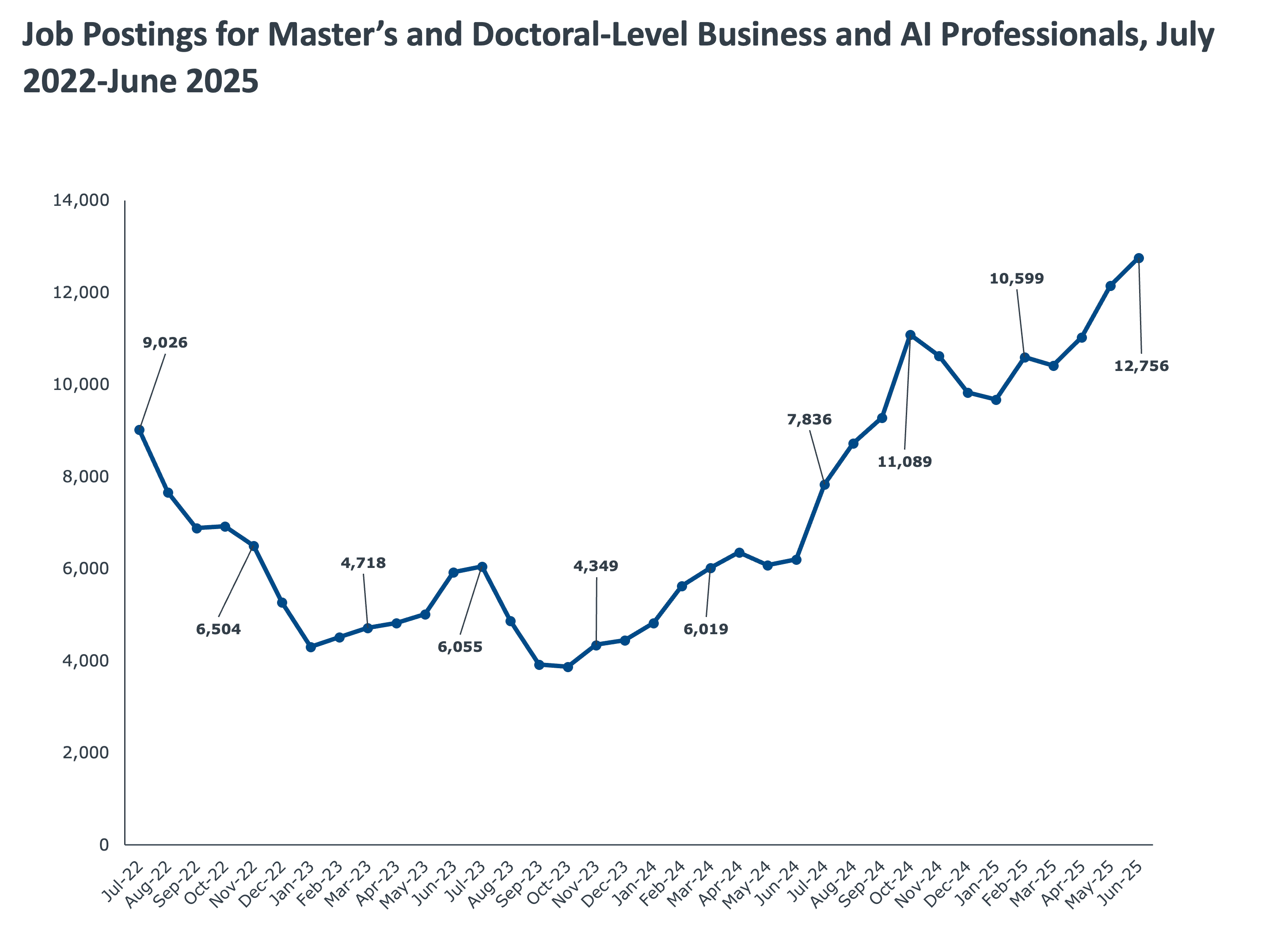AI is no longer optional
By Kayla Faulk
Kayla Faulk is an undergraduate student at Howard University and an intern with EAB’s Professional and Adult Education division, where she researches trends in graduate education.
It’s no longer enough to understand business fundamentals—business school grads need to know how to use AI tools to make strategic, human-centered decisions. And of course, employers increasingly value graduates who can pair technical literacy with ethical leadership and adaptability.
As a current undergraduate student, I’ve also been thinking about how my program will prepare me for a job market changed by AI. The fear of choosing a program that wouldn’t equip me with the right skills and resources to succeed in the workforce was overwhelming. Like many students, what ultimately guided my decision in selecting a major was the opportunity to learn about technologies that are widely used in the industry I hope to enter.
For business school leaders, the next step is clear: integrate AI into business education to meet the demands of both students and the evolving workplace. Below are two key reasons why this evolution is critical for graduate business programs to remain relevant and built for today’s workforce.
Employer demand for business professionals with AI skills is increasing
AI is no longer solely used in tech fields and departments: it’s now embedded across operations, strategy, logistics, and marketing. 80% of senior business executives believe AI boosts productivity and creates new business opportunities. But leveraging AI effectively means more than knowing how AI-powered tools work—it requires a new kind of leadership that can balance automation with human judgment.
Recent research shows that the most successful use of AI involves collaborative systems that enhance human decision-making. For example, strategic planning now often involves predictive modeling powered by AI, and most tools like this are only valuable if business leaders know how to interpret and ethically apply the results. That’s why business programs that go beyond surface-level AI exposure are becoming increasingly important.
Here’s How to Leverage GenAI Across Your Grad and Adult Portfolio
To quantify demand for graduate-level business professionals with AI skills compared to demand for those without, we compared job postings for master’s and doctoral-level business school grads with and without AI competencies. While employer demand declined -0.79% for master’s- and doctoral-level professionals overall, the employer demand for master’s- and doctoral-level business and AI professionals grew by 1.62% over the past 36 months. These findings show that, despite broader job market trends, demand for business professionals with AI training is strong and continuing to rise.

Graduate student expectations for return on investment (ROI) and career preparedness are shifting
As a graduating college senior, I know many of my peers are considering graduate school to better prepare themselves for careers that involve working alongside AI. There’s a shared concern that without the right training, we’ll enter the workforce unprepared to use the tools employers increasingly expect us to know.
My peers and I are searching for curricula that address not just how to use AI, but how to do so ethically. According to the 2025 GMAC Prospective Student Survey, 54% of GME (graduate management education) students want to understand AI’s role in society and business ethics. Additionally, the survey found that GME students research programs’ return on investment more often than any other factor, with 42% of prospective students prioritizing ROI over rankings. Career outcomes follow closely behind at 39%.
These insights highlight a growing expectation: students want programs that will prepare them for the real-world challenges and opportunities of AI. They’re drawn to hands-on experiences, cross-functional leadership development, and courses that will truly prepare them for the changing workforce. Business schools that deliver on these priorities will be best positioned to attract students and receive positive feedback on their programs’ career outcomes.
Do You Know How to Effectively Engage Today’s Graduate Business Students?
How business schools can best prepare their grads for a changing workforce
So, what can business programs do to signal to students that they will ensure their graduates are competitive in the job market? Consider offering AI-focused specializations within existing MBA or MS programs, adding interdisciplinary courses that bridge business strategy with AI applications, or building hybrid programs that blend management with technical literacy.
Some schools are already competing to get ahead. For example, the University of Baltimore offers an MBA specialization in AI that applies machine learning across finance, marketing, and operations, while Saint Xavier University has launched a full MBA in Artificial Intelligence focused on strategic management and ethical tech use. Rutgers Business School offers a Mini MBA in AI to help professionals understand automation’s business impact, and Northeastern’s MBA x AI builds both technical depth and leadership capacity in students through real-world application.
What makes these programs compelling is the way they embed AI literacy into the core business experience. Rather than isolating technical knowledge into electives or assuming students will “pick it up later,” they reimagine marketing, operations, and leadership courses to include AI tools and applications. For example, students might learn how generative tools shift organizational design or how AI-powered insights change the nature of executive decision-making. Equally important is the inclusion of coursework that addresses automation bias, ethical leadership, and inclusive tech design, ensuring that students can use AI tools and AI-generated insights responsibly.
Do You Have a Reliable Source of High-Intent Graduate Business Leads?
By updating course offerings and empowering faculty with support and training, schools can ensure students graduate with the skills needed to thrive in an AI-enhanced workforce.
But it’s not just about what’s in the classroom: schools also need effective strategies to connect with the right students to fill these newly designed programs. Appily Advance, EAB’s graduate and adult lead generation solution, can assist by sourcing a high volume of high-intent names who are looking for a graduate business program like yours. In a competitive education market, this type of human-centered recruitment strategy can help set leading programs apart.
More Blogs

The big bets that actually drive online enrollment growth

How to use state demand data to launch or revitalize programs
